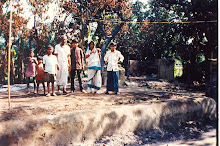Rest,
Relaxation and Regeneration in Rural Bangladesh:
The
Chittanju Praasaad (Palace) in Coastal Pirojpur
Dr.
Sachi G. Dastidar
ISPaD:
Partition Documentation Project Report; January 25, 2019
Whomever thinks of rest
and relaxation in the world’s densest country must be really out of mind. Generally,
this is true until one visits the palace that my wife and I called Chittanju
palace in honor of our Bangladeshi friends Chitta Ranjan and his wife Anju
Debi, although they have named the new building after their parents, not
Chittanju. It is a brand new modern palace-like building
in the midst of southern rural setting. It has all the modern amenities from
hot water to Wi-Fi to modern kitchen, and room with balconies. The Hindu couple
in a Muslim-majority nation with a long history of Hindu persecution since the
days of 1947 Partition of Bengal and India have made sure that both the majority
Muslims and minority Hindus are not only welcome here but pushed to prosperity. The
couple and their extended family has opened a new liberal arts college or
General College, a Krishi or Agriculture College, and a new Shyamali Library,
named after Chitta’s sister. These have created dozens of jobs and paths to prosperity
in that distant rural hinterland.
Location of Pirojpur in Bangladesh
The building is designed
with a large front yard with a Hindu Mandir (temple) dedicated to Lord Mother
Sitala, protector of agricultural life, a Memorial Wall dedicated to ancestors
and the newly departed, and a tower for Bangladesh Independence. Being close to
the ocean – the Bay of Bengal – local rivers, streams and canals enjoy normal
tides. Thus the property has a pond connected with local stream receiving high
and low tides, and within the property has a manmade foot bridge, a sluicegate
controlling the flow of water, and most importantly a wooden country boat that
guests can enjoy water ride.
For the pleasure of
guests, the couple has arranged for scores of caretakers attending to the
pleasures of the guests, as well as baburchis
(chefs) catering to guest’s tastes. As three of us stayed at the palace in
winter, fresh juice from date palm trees – khejurer
rosh – were served in the morning. (Traditionally it has to be consumed
early in the morning in winter season before fermentation starts with the rise
of temperature. These days it is practically unavailable in the big cities
where one gets molasses – khejur gur
– made of that juice.) Since it is in the rural area quietness is its main
attraction, however, one may walk through the quite countryside. The palace is
reachable either via Barishal Airport from Dhaka ($40; 40 minutes), then a car ride
($60; 3 and ½ hour, 100 kilometers), or from Kolkata, India 6 and ½ hours – 3
hours from Kolkata Airport ($35; 3 hours, 90 kilometers) to the Benapole India-Bangladesh
border, then 3 and ½ hour by car ($75 dollars.; 130 kilometers).
It is wonderful to see
individual decisions have helped create so many opportunities and so many jobs
in a remote corner of the world.
Thanks to Mr. Chitta, Mrs. Anju and their extended family for creating such a wonderful place!
The Palace at Night
Memorial Wall
Mother Sitala Mandir (Temple)
The Country Boat
Visitors on the Boat


















No comments:
Post a Comment